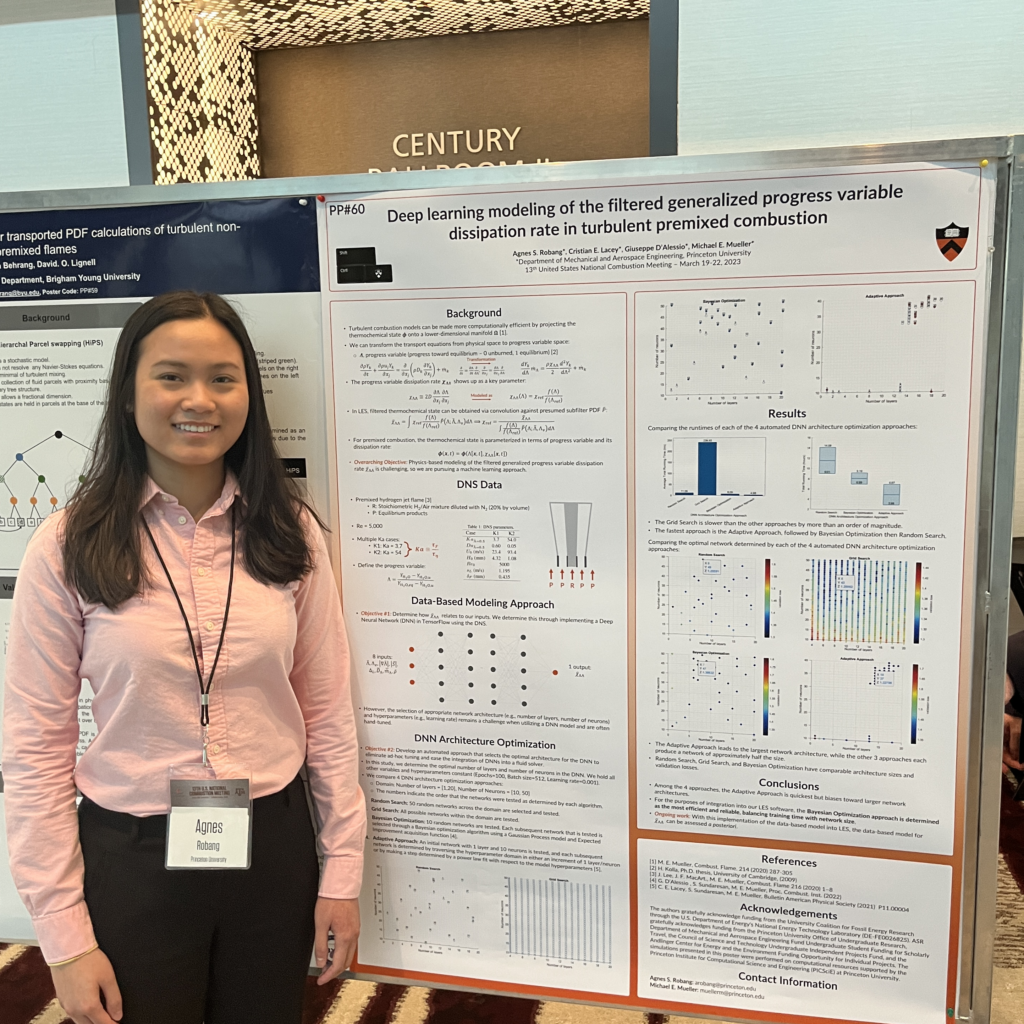From March 19 to 22, 2023, I was at the 13th U.S. National Combustion Meeting presenting a research poster. My work was titled, “Deep Learning Modeling of the Filtered Generalized Progress Variable Dissipation Rate in Turbulent Premixed Combustion”. In my junior year, as I was planning what to work on for my thesis and what goals I hoped to attain, I determined that I wanted to go the extra mile in my research, enough to be able to go to an academic conference. With some hard work, the patient guidance of my adviser Prof. Michael Mueller, the support from my labmates at the Computational Turbulent Reacting Flow Lab, and the funding from several sources (MAE, CST, OUR, and ACEE), I was able to attend this conference! This was my first research conference, and I cannot overstate how valuable this experience has been to my growth as a researcher.
Prior to the conference, my entire lab jointly supported one another in preparing our presentations, providing feedback and comments. This process, where we continually shared what we were working on (successes and obstacles) throughout the year, taught me a lot about both the breadth of the field as well as research collaboration. Leading up to the conference, sitting in my labmate’s practice talks also gave me much insight into what makes a good presentation/poster. During the conference, my lab all watched each other’s presentations and visited my poster to provide support. We also introduced each other to the colleagues and friends we had in the field of combustion to broaden our network collectively. We attended as many conference sessions as we could across the field of combustion to expand our own knowledge and perspective of the field. We also went out of our way to reach out to fellow researchers to ask questions, share our experiences, and exchange knowledge related to combustion research and beyond. As my lab went to the sessions together, we were all coming from a similar perspective of combustion, so it was very helpful learning together and making connections to our field.
On the third day of the conference, I participated in the Women in Combustion Luncheon where I met other fellow women in the field of combustion. Together, we shared our unique experiences in the male-dominated field of combustion. We brainstormed ways to draw and retain more women in the field and ways in which the Combustion Institute (and the combustion field more broadly) can implement policies and programs to better support the women of the field. I also participated in the Career and Mentorship Mixer where I sat with graduate students, postdocs, and faculty. Much of the conversation revolved around post-graduate school career options and faculty life. As an undergrad, I have some years before I have to worry about any of those, but it was very interesting and helpful to gain some insight early on to see what life in those careers may look like.
I came into the conference very nervous about presenting my poster and worried about how to interact with others who would all be my senior. Being able to stand side by side with other researchers and faculty and discuss our different research experiences and shared interest in combustion helped me realize that, at our core, we are all people. The combustion community is a caring, supportive community that wants to see all of its members succeed. As the conference progressed, I found myself becoming less shy, and I found the confidence to approach researchers and professors whose work I found interesting.
I spent much of my spring break studying my research thus far and all of the small details of my work in case I would receive very detailed questions. I approached this with anxiety because the poster session felt to me like a personal test. The conference atmosphere, however, changed my perspective. Those who stopped by my poster were genuinely curious to learn about the work that I did and were very understanding if they asked a question that I was not too sure how to answer. Those within my specific niche gave lots of constructive criticism, while those whose work was more tangential to mine learned from me as much as I learned from their perspective. Now, I view conferences more as a venue for idea exchange and field appreciation. Speaking to the graduate students in my lab confirmed this. We all agreed that we left the conference feeling like we appreciated the field of combustion so much more and that we have learned so much over the few days we were at the conference. The conference gave me a renewed sense of motivation and energy to continue dedicating my time and efforts towards my research.
— Agnes Robang, Engineering Correspondent


